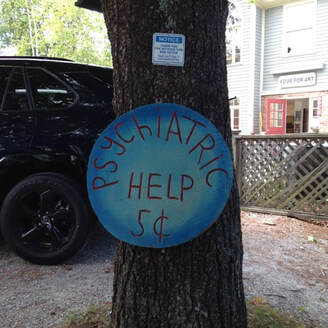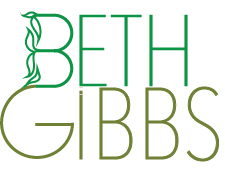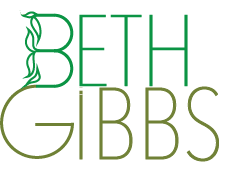ENLIGHTEN UP! a blogSelf-awareness stories: lighting our way to clarity, contentment and resilience in a complicated world.
|
 Photo: www.tomfiorini.com Photo: www.tomfiorini.com “So many tangles in life are ultimately hopeless that we have no appropriate sword other than laughter.” - Gordon Allport, psychologist and educator The photo may remind you of Lucy’s psychiatry booth from the Peanuts comic strip by Charles Shultz. Lucy's booth is a long-running gag. It reminds us that as long as we are vertical, ventilating and still on the right side of the ground, we are probably dealing with several of life’s tangles. Some of us will seek counseling or psychiatric help, I certainly did when I needed it. Many of us can get through it all with laughter. Along with self-awareness skills, laughter is my go-to therapeutic self-help technique at present. And fortunately, laughter is free! The Mayo clinic lists several benefits. Laughter can:
A sense of humor helps. Do you have one? I hope so! A sense of humor is defined as the ability to perceive, appreciate or express what is funny, amusing or ludicrous. Having a sense of humor means being able to laugh at, or at least see the humor in life's absurdities. And with global warming and political storming, we have all the absurdities we can handle at the moment. Lindsay Holmes, the Deputy Healthy Living Editor at The Huffington Post, lists six signs that you have a sense of humor: 1. You make laughing a priority 2. You practice self-acceptance 3. You’re creative 4. You’re conscientious 5. You have good physical well-being 6. Aging is just a fact of life to you I have two responses to Lindsay’s list. First, number five: You have good physical well-being. Fortunately, having a sense of humor does not necessarily depend on physical well-being. It’s great if you have it, but most of us are dealing with some physical discomfort or dis-ease. If you are experiencing a difficulty, illness or imbalance that’s interfering with your physical or mental well-being, a sense of humor and the ability to laugh can help. According to the Cancer Treatment Centers of America, laughter, or humor therapy, helps promote overall health and wellness. Laughter therapy modalities use the physiological process of laughter to help relieve physical or emotional stress, distress or discomfort. Surgeons used humor to distract patients from pain as early as the 13th century. In the 20th century, scientists studied the effect of humor on physical wellness. Many credit this modern use of laughter to Norman Cousins. Remember him? He was a political journalist, author, professor, and world peace advocate who suffered from ankylosing spondylitis, a painful connective tissue disease. In addition to medical treatments he added laughing, long, loud and often, and found that ten minutes of hearty laughter would reduce his pain and help him sleep. Next is number six: Aging is just a fact of life to you. This relates directly to number two: You practice self-acceptance. This is important. Have you ever heard the phrase, “Aging is not for sissies?” Here’s another one I from a woman in my book group, “Aging is a bitch!” And I saw this next one on a mug in a gift shop, “Life’s a bitch and then you die.” Aging, however we view it, is inevitable, but if we accept that inevitability, we can find many ways to laugh at the process. The best part of incorporating liberal doses of humor in your life is that laughing doesn’t cost a dime and it’s calorie free! As matter of fact, research published in the International Journal of Obesity found that 15 minutes of laughter a day will burn between ten and 40 calories, depending on a person's weight and the intensity of the laughter. That is enough to lose between one to four pounds a year! (https://www.sharecare.com/health/calories/how-many-calories-burn-laugh). If laughter doesn’t come easily to you, try a laughing club. Laughing clubs meet regularly to take part in communal laughing for therapeutic effect. The idea got started in India in the mid-1990s. It promotes the ideal of a non-political, non-religious, non-racial, non-threatening, and non-competitive approach to laughter. Its core premise is that your body knows how to laugh, regardless of what your mind has to say. Because it follows a body-mind approach to laughter, participants do not need to have a sense of humor, know jokes, or even be happy. The invitation is to “laugh for no reason.” To find one near you, Google: laughter club near me. Personally, I make it a point to laugh every day. It always makes me feel better no matter what absurdity or problem might be present or looming – and there is always something! I DVR The Daily Show (political satire), Full Frontal with Samantha Bee (political satire), and Saturday Night Live (cultural & political satire) - see a pattern here? I get my laughs by watching one or more of the shows after my morning meditation practice. By the time I have finished my breakfast, I’ve had my share of belly laughs, increased my endorphin flow and have set a positive outlook for the day. Well, most of the time – it’s all a process and some days are better than others but at least I put in the effort. I’ve even created and performed stand-up comedy in a couple of local venues, it’s terrifying and gratifying at the same time, and when the audience laughs, it feels as good as sex and better than chocolate! I also try to infuse my writing with a bit of humor when I can. You can find a sample of my humorous take on perfectionism here: (www.bethgibbs.com/nobodylovesperfect.html) A classic Vulcan salutation from Star Trek’s Mr. Spock is, “Live long and prosper.” To end this article, I say, “Live long and laugh!”
1 Comment
7/27/2020 12:11:54 pm
I would like to thank you for the efforts you have made in writing this article
Reply
Your comment will be posted after it is approved.
Leave a Reply. |
Archives
July 2024
AuthorBETH GIBBS started her yoga practice in 1968, four months after her son was born and she’s been practicing ever since. She currently teaches all levels therapeutic yoga classes for adults, and specialty classes for seniors in the Hartford, Connecticut area. Beth is a certified yoga therapist through the International Association of Yoga Therapists and is guest faculty at the Kripalu School of Integrative Yoga Therapy. She writes for the blogs, Yoga for Healthy Aging, and Accessible Yoga. Her master’s degree from Lesley University in Cambridge, MA is in Yoga Therapy and Mind/Body Health. Categories |
|
|
Enlighten Up! a Blog
|
Copyright © 2023 Beth Gibbs

 RSS Feed
RSS Feed
